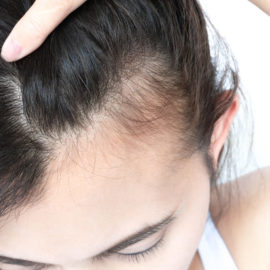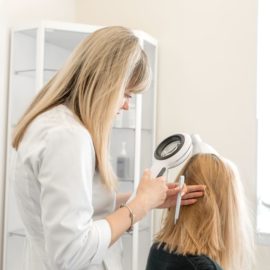Developing a scalp stimulator for hair growth today means taking into account new consumer trends and developments. Brands must realize the “wellness” movement has evolved and matured, opening up new opportunities for BPC companies to develop narratives. We analyse the “well-mastering” movement and how a scalp stimulator for hair growth that makes use of adaptogens can match new consumer interests and demands.
Content
What is the well-mastering movement and the role of adaptogens in such a context
The “well mastering” movement is a recent phenomenon that goes beyond wellness and, in fact, is understood as a “next-level wellness” narrative.
In such a context, consumers have grown their self-care demands and interests. In fact, self-care is a booming concept across the BPC market: there are more than 110,000 average weekly searches for self care, up 25% to last year, according to a survey by Bazaarvoice and Influenster.
This new type of consumer is thus interested in products that enhance his or her wellness through beauty products that suggest daily routines in the form of rituals. These routines are understood from a mindfulness perspective, where users understand personal care as being able to take a moment to relax and connect with the present, in search of inner peace.
The mindfulness approach also means both physical and mental health must be addressed. Consumers are looking for products that help them connect with their emotions in a mindful way, understanding the body and mind as a holistic system.
This merging of inner and outer beauty is found across consumer surveys. For instance, 38% of US consumers aged 25-34 are interested in beauty products that help them reduce anxiety and stress, according to figures by Mintel.
Thus, new “well mastering” narratives include keywords and concepts such as resting, balance, consciousness, healing, recovery, mental awareness, and mood-supporting and mind-clearing rituals.
When it comes to the actual way brands can include this new narrative into their product development, the “well mastering” movement means a boost for adaptogens.
Briefly described, adaptogens are botanical substances that help the body restore balance and cope with physical or mental stress. Some emerging adaptogens include maca, moringa, holy basil, ashwagandha, Rhodiola rosea and amla (Indian gooseberry), as well as certain medicinal mushrooms.
Today, mentioning adaptogens on product claims is still niche. In fact, only 0,02% of all BPC launches during the period from July 2015-June 2019 contain adaptogen ingredients.
However, they stand out as having the potential to appeal to stressed-out consumers seeking self-care products, while also merging with the botanical ingredients trend.
As to the specific benefits of adaptogens, they vary, but in general, these substances claim to minimize fatigue, improve focus and endurance, and protect the body from stress. This is where their potential for appealing new consumers lies, including them in hair care narratives such as the development of a scalp stimulator for hair growth.
Besides, adaptogens are linked to ayurveda practices, and have been successfully used together pushing the well-being message further for health-conscious consumers.
At the same time, while adaptogenic ingredients grow in popularity, they can be used in conjunction with ingredients that present more popular health claims. For instance, pairing adaptogens with magnesium can be a winning formula, as the latter presents a well-known claim for the reduction of tiredness and fatigue, adding credibility to a product.
KERASCALP™: the scalp stimulator for hair growth that builds “well mastering” narratives
KERASCALP™ presents companies with an opportunity to embrace this new “well mastering” narrative. Due to its ayurvedic and adaptogenic origin, this scalp stimulator for hair growth acts on scalp aging signs before they appear, as it prevents follicle miniaturization and weakening.
It doesn’t just act as a scalp stimulator for hair growth, but also improves hair health in many ways, making hair look shinier and rebalancing the scalp, recovering its vitality and improving its strength.
In order to develop this active, at Provital we’ve combined an ancient ayurvedic well-aging secret and advanced botanical research. The main natural adaptogen ingredient in KERASCALP™ is Amla, known for its wellness and well-aging benefits for scalp & hair, based on a rasayana (rejuvenator) ingredient in ayurveda medicine.
KERASCALP™ targets hair follicle miniaturization, which leads to the visible effects of hair aging (thinner hair that loses volume, breaks easier and grows more slowly).
In order to counter this process, KERASCALP™ provides anti-aging effects by analysing the activity of genes and proteins involved in the miniaturization process and acting on this process.
Its efficacy has been proved through in-vitro testing (60% stronger hair follicles; -39% aging signs) and ex-vivo testing (the active increases the proliferative capacity of the hair bulb up to 22% compared to control follicles).
Thus, it presents an excellent opportunity for brands to develop a scalp stimulator for hair growth that addresses the “well-mastering” trend. At the same time, as the stigma around men’s mental health slowly diminishes, KERASCALP™ can help brands approach men working through their anxieties.
At the same time, the active meets consumer demands for natural ingredients that are sustainably obtained and produced: it’s a waterless formulation, 100% natural origin as per ISO 16128-Natural Origin standards, while it’s been certified as Cosmos approved and halal, as well as vegan compliant.
No comments yet
There are no comments on this post yet.





Leave a comment